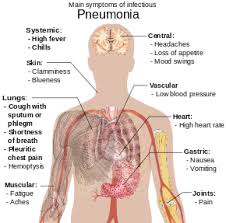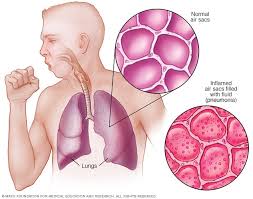It’s commonly a complication of a respiratory infection—especially the flu—but there are more than 30 different causes of the illness. Older adults, children and people with chronic disease, including COPD and asthma, are at high risk for pneumonia.

What Are the Symptoms of Pneumonia?
Pneumonia symptoms can vary from mild to severe, depending on the type of pneumonia you have, your age and health.
The most common symptoms of pneumonia are:
- Cough (with some pneumonias you may cough up greenish or yellow mucus, or even bloody mucus)
- Fever, which may be mild or high
- Shaking chills
- Shortness of breath, which may only occur when you climb stairs
Additional symptoms include:
- Sharp or stabbing chest pain that gets worse when you breathe deeply or cough
- Headache
- Excessive sweating and clammy skin
- Loss of appetite, low energy, and fatigue
- Confusion, especially in older people
Symptoms also can vary, depending on whether your pneumonia is bacterial or viral.
- In bacterial pneumonia, your temperature may rise as high as 105 degrees F. This pneumonia can cause profuse sweating, and rapidly increased breathing and pulse rate. Lips and nailbeds may have a bluish color due to lack of oxygen in the blood. A patient’s mental state may be confused or delirious.
- The initial symptoms of viral pneumonia are the same as influenza symptoms: fever, a dry cough, headache, muscle pain, and weakness. Within 12 to 36 hours, there is increasing breathlessness; the cough becomes worse and produces a small amount of mucus. There may be a high fever and there may be blueness of the lips.

What Causes Pneumonia?
Many different germs can cause pneumonia. There are five main causes of pneumonia:
- Bacteria
- Viruses
- Mycoplasmas
- Other infectious agents, such as fungi
- Pneumonia may also be caused by inhaling various chemicals and environmental agents
If you have viral pneumonia, you also are at risk of getting bacterial pneumonia.
Understanding the cause of pneumonia is important because pneumonia treatment depends on its cause.
What Are Risk Factors?
Anyone can get pneumonia, but some people are at a higher risk than others.
Risk factors (that increase your chances of getting pneumonia) include:
- Cigarette smoking
- Recent viral respiratory infection—a cold, laryngitis, influenza, etc.
- Difficulty swallowing (due to stroke, dementia, Parkinson’s disease, or other neurological conditions), which can lead to aspiration (breathing in a foreign object)
- Chronic lung disease such as COPD, or cystic fibrosis
- Cerebral palsy
- Other serious illnesses, such as heart disease, liver cirrhosis, or diabetes
- Living in a nursing facility
- Impaired consciousness (loss of brain function due to dementia, stroke, or other neurologic conditions)
- Recent surgery or trauma
- Having a weakened immune system due to illness, certain medications, and autoimmune disorders






